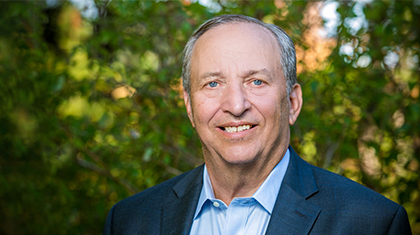Lawrence H. Summers, a former U.S. Treasury secretary and president emeritus at Harvard University, has been named a University of Miami Distinguished Presidential Scholar. He will visit the University of Miami campus for four to five days each spring, beginning in late March 2020.
Recognized as among the world’s most eminent economists and a brilliant professor with an astute understanding of the business sphere, Summers will occasionally visit the University of Miami campus to meet with students and faculty members, bringing his unique blend of experience and acumen to the community.
"Few economists in the world have the breadth and depth of experience that Larry Summers has accumulated through outstanding service in the public, private, and academic sectors,” said President Julio Frenk. “At a time of complex economic and political transformation nationally and globally, we are honored to welcome him to the University of Miami as a Distinguished Presidential Scholar.”
John Quelch, dean of Miami Herbert Business School, the host school for Summers' time at UM, likewise recognized the value of Summers’ University appointment.
“We are honored to host Professor Summers, whose career has bridged the worlds of academia, public policy, and business,” Quelch said. “His support and advice to all Miami Herbert stakeholders will be invaluable.”
The University has established the Distinguished Presidential Fellows and Scholars initiative as part of its efforts to attract some of the world’s most celebrated and accomplished scholars and thinkers to interact with the University community. These individuals are invited to contribute their unique perspectives and talents to the University’s mission of fostering inquiry, expanding knowledge, and pursuing novel solutions to urgent issues.
Summers brings a learned past to his new role. He earned his bachelor’s degree from the Massachusetts Institute of Technology in 1975 and his doctorate from Harvard in 1982. The ensuing year, he became a tenured professor of economics, one of the youngest individuals in recent Harvard history to earn that distinction.
He was the first social scientist ever to receive the annual Alan T. Waterman Award of the National Science Foundation, an honor bestowed on an exceptional young U.S. scientist or engineer whose work demonstrates originality. Summers also was awarded the John Bates Clark Medal, given every two years to the nation’s best economist younger than the age of 40. He has published more than 150 papers in scholarly journals.
Over a span of two decades, Summers has served in a range of senior policy posts in both the Clinton and Obama Administrations, while advancing a parallel career as an academic leader.
While still at Harvard, Summers launched his government career as senior staff economist for the Council of Economic Advisors in the Reagan administration. Following a period in professorship at Harvard, he left to work for two years as chief economist for the World Bank. In 1993, he was appointed Undersecretary for International Affairs, and served from 1999 to 2001 as U.S. Treasury secretary under President Bill Clinton. During this tenure, Summers played a leading role in developing the Clinton administration’s response to financial crises in Mexico, Asia, and the Soviet Union.
Appointed the 27th president of Harvard in 2001, Summers served in that stead through 2006. During his term, he launched an effort to make the university the global leader in life sciences research. In one commencement address, Summers highlighted his belief in the “unique and irreplaceable mission of universities” and noted the increased global disparities in the world: “… It is a world where opportunities have grown greater for those who know how to teach children to read … and also one where some are left further and further behind—those who are not educated, those trapped in poverty and violence… .”
In 2009, Summers returned to government. Named director of the National Economic Council for the Obama administration, he served as chief economic adviser to the president and played a prominent role in steering the country through the worst financial crisis since the 1930s.
He returned to Harvard in 2011 as both professor and director of the Mossavar-Rahmani Center for Business and Government Center at the university’s Kennedy School of Government and continues to teach classes on the evolution and influences of globalization.
For his part, Summers is excited to spend time with the students and faculty members of the University and advance its pursuit toward becoming the preeminent hemispheric university.
“Miami is the United States' gateway to Latin America at a time when the Americas face big challenges and have great opportunities,” Summers said. “The University of Miami has a great role to play at a time when democracy is under threat in ensuring that the Americas have not only government by the people, but also government for the people.”

